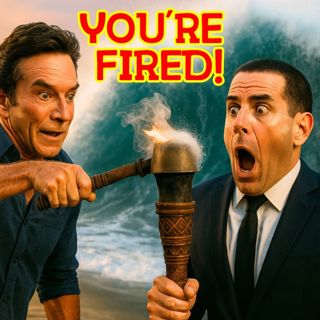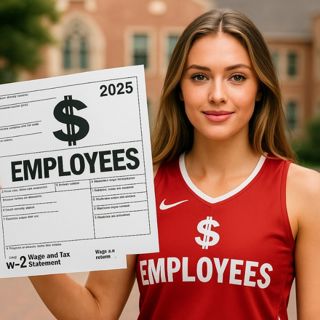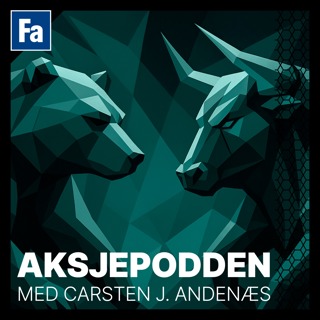
E149: Mass Incarceration Is a Myth — The Shocking Truth EXPOSED
An in-depth discussion with legal scholar Jeffrey Seaman debunking popular myths about mass incarceration, examining crime clearance rates, sentencing trends, and exploring justice-focused reforms.Guest bio:Jeffrey Seaman is a Levy Scholar at the University of Pennsylvania Law School, researcher, and co-author of Confronting Failures of Justice. His work focuses on criminal justice policy, sentencing reform, and aligning the system with community standards of justice.Topics discussed:Myths vs. facts about U.S. incarceration ratesThe small role of low-level drug offenders in prison populationsDeclining crime clearance rates and their public safety impactSentencing trends since the 1960s and public opinion on appropriate punishmentRepeat offenders, leniency, and juvenile justice failuresInternational comparisons and moral credibility of the lawPotential of “electronic prison” as a cost-effective alternative to incarcerationBalancing defendants’ rights with victims’ rightsPolitical shifts in crime policy and public opinionHistorical parallels with Prohibition and lessons for modern reformThree best quotes:“The average offender doesn’t feel deterred until they perceive a 30% chance of being caught—and for most crimes, we’re nowhere near that.”“Most people in prison today have had five, ten, even fifteen prior chances; the idea that they’re first-time offenders is a myth.”“If the law gets out of sync with what the community believes is just, you lose moral credibility—and with it, compliance, cooperation, and safety.” 🎙 The Pod is hosted by Jesse Wright💬 For guest suggestions, questions, or media inquiries, reach out at https://elpodcast.media/📬 Never miss an episode – subscribe and follow wherever you get your podcasts.⭐️ If you enjoyed this episode, please rate and review the show. It helps others find us. Thanks for listening!
13 Aug 53min

E148: From Student-Athlete to Influencer-Athlete: The Future of College Sports
Graham Hillard, editor at the James G. Martin Center for Academic Renewal, discusses the rapid professionalization of college sports under NIL, the legal chaos reshaping athletics, and the uncertain future of the NCAA’s role.Guest bio:Graham Hillard is the editor at the James G. Martin Center for Academic Renewal and a contributing writer for Washington Examiner magazine. He writes on higher education, athletics, and public policy, with a focus on costs, governance, and legal trends.Topics discussed:NIL (Name, Image, Likeness) payments and the House v. NCAA settlementProfessionalization of college football and men’s basketballAntitrust rulings (NCAA v. Alston) and their ripple effectsPotential spinoffs of athletic programs into for-profit entities (e.g., Kentucky model)Title IX implications for revenue sharingEconomic sustainability of non-revenue sportsThe growing role of courts in regulating college athleticsFan experience in the NIL eraPotential super leagues and conference realignmentEmployee status for athletes and possible collective bargainingDonor influence and university politics in athletic decisionsMain points:College football and men’s basketball are moving toward an NFL-style salary cap model, with NIL and direct university payments legalizing player compensation.The NCAA’s authority is eroding, and many governance questions are now being decided in the courts through high-profile lawsuits.Only a small percentage of athletes will significantly benefit from NIL, while most may lose the scholarship-based perks they previously enjoyed.Title IX could require revenue-sharing with women’s sports, creating complex financial and recruiting implications.Schools may eventually split: a “super league” for money sports, and an amateur model for others.Top 3 quotes:“College football has to start where the NFL was in 1930—none of the business rules are in place yet, and it’s the wild west out there.”“We just ruined the whole thing to make 1,000 eighteen-year-olds millionaires, and it wasn’t worth it.”“If we’re going to treat high-dollar college athletes as professionals, then they have to honor their contracts—this fast-and-loose system is not tenable.” 🎙 The Pod is hosted by Jesse Wright💬 For guest suggestions, questions, or media inquiries, reach out at https://elpodcast.media/📬 Never miss an episode – subscribe and follow wherever you get your podcasts.⭐️ If you enjoyed this episode, please rate and review the show. It helps others find us. Thanks for listening!
9 Aug 1h 18min

E147: Let Colleges Fail! 84-Year-Old Professor Exposes the Truth
Economist Richard Vedder argues that U.S. colleges are bloated, inefficient, and increasingly out of touch with students and the job market. He explains why creative destruction is necessary—and inevitable—in higher education.👤 Guest BioRichard Vedder is Professor of Economics Emeritus at Ohio University, Director of the Center for College Affordability and Productivity, Senior Fellow at the Independent Institute, and author of Let Colleges Fail: The Power of Creative Destruction in Higher Education. He has taught since 1963 and is one of the most prominent critics of administrative bloat and inefficiency in academia.🎙️ Topics DiscussedDeclining college enrollment and public trustAdministrative bloat and faculty workloadThe rise of useless degrees and “make-work” programsAdjunctification and the academic underclassThe sorting function of college (and its failure)Alternatives to traditional degreesCreative destruction in higher edAI’s impact on the knowledge economy and higher educationHow higher ed became disconnected from market forces and studentsIdeas for reform: 3-year degrees, college equivalency exams, credit portability📌 Main PointsEnrollment is dropping for the first time in modern U.S. history, even as the population grows—reflecting broad disenchantment with higher education.Administrative bloat is one of the most destructive trends: some universities now employ more administrators than faculty.Adjunctification has created an academic underclass: a two-tier system where elite tenured professors publish unread papers while low-paid adjuncts teach most students.College no longer sorts talent effectively—grade inflation and credential inflation make it harder for employers to assess student value.AI is disrupting white-collar work, challenging the basic rationale for many college degrees.Solutions include shorter degree programs, reduction of admin staff, greater use of technology, modular degrees, and creative destruction through institutional failure.💬 Top 3 Quotes“Universities are in the knowledge business—but the one thing they don’t want you to know is what they’re actually doing.”“There are more administrators in diversity, equity, and inclusion today at some universities than there are history professors.”“We used to replace muscle with machines. Now we’re replacing brains—and that should terrify the higher ed establishment.” 🎙 The Pod is hosted by Jesse Wright💬 For guest suggestions, questions, or media inquiries, reach out at https://elpodcast.media/📬 Never miss an episode – subscribe and follow wherever you get your podcasts.⭐️ If you enjoyed this episode, please rate and review the show. It helps others find us. Thanks for listening!
6 Aug 57min

E146: Can Dementia Actually Be Reversed? Neurologist Explains
Neurologist Dr. Robert P. Friedland discusses how lifestyle choices influence aging and Alzheimer's risk.Guest Bio:Dr. Robert P. Friedland is a neurologist at the University of Louisville, specializing in Alzheimer's research, brain health, and aging. He is the author of Unaging: The Four Factors That Impact How You Age.Topics Discussed:Alzheimer's diseaseDementia and polypharmacyCognitive, physical, psychological, and social reservesLifestyle factors influencing brain healthGenetic testing and Alzheimer's riskAging, longevity, and evolutionSocial connectedness and agingMain Points:Up to 20% of dementia cases could be reversible, often linked to polypharmacy or treatable conditions.Aging well involves optimizing four reserve factors: cognitive, physical, psychological, and social.Lifestyle changes, including diet, exercise, and social engagement, can significantly reduce Alzheimer's risk.Genetic predispositions don’t guarantee Alzheimer's; lifestyle choices play a larger role.Alzheimer's incidence is declining proportionally due to improved lifestyle habits despite an aging population.Social connectedness and maintaining purpose dramatically impact longevity and cognitive health.Human bodies are not evolutionarily optimized for extreme old age; longevity is a modern opportunity.Top 3 Quotes:“Aging itself is not inevitable...getting old is an opportunity denied to many.”“It matters what we do...our lifestyle factors significantly influence the risk of cognitive impairment.”“Social activity and psychological resilience are just as crucial as physical and cognitive health in preventing Alzheimer's.”Disclaimer: This podcast is for informational purposes only and does not constitute medical advice; always consult a healthcare professional for personal medical guidance 🎙 The Pod is hosted by Jesse Wright💬 For guest suggestions, questions, or media inquiries, reach out at https://elpodcast.media/📬 Never miss an episode – subscribe and follow wherever you get your podcasts.⭐️ If you enjoyed this episode, please rate and review the show. It helps others find us. Thanks for listening!
2 Aug 55min

E145: How Survivor Explains Office Politics — Former Marlins President David Samson Explains
Former Marlins president and Survivor contestant David Samson breaks down how the game mirrors office politics, alliances, and power dynamics in everyday life and the workplace.👤 Guest Bio:David Samson is the former president of the Miami Marlins (2002–2017) and a contestant on Survivor: Cagayan (Season 28), where he was the first person voted out. He's now the host of the daily podcast Nothing Personal with David Samson, a regular MLB analyst on CBS Sports, and a frequent guest on The Dan Le Batard Show and Pablo Torre Finds Out.🧩 Topics Discussed:Survivor as a metaphor for office politicsBuilding alliances in corporate lifeThe burden and benefits of having a target on your backRecognizing ceilings and "goats" in workplace hierarchiesLessons from Wall Street and Major League BaseballPersonal reflections on leadership, loyalty, and self-awarenessBehind-the-scenes Survivor insights, including pregame isolation and casting dynamicsThe social game vs. the performance gameHow to identify who’s rising in an organization—and ride with them📌 Main Points:Survivor reflects real life: You see the same dynamics in workplaces, relationships, and family structures—power struggles, alliances, betrayals, and perception management.Leadership = Target: If you're truly leading, people are looking at your back. That's a good sign.Alliance > Talent: Advancement often depends more on strategic alliances than pure competence.Goats exist everywhere: Not everyone is meant to rise—some people excel exactly where they are. That’s not failure; it’s fit.Know your ceiling: Great leaders identify who has growth potential and who is already operating at their peak effectiveness.Adapt or perish: Whether in Survivor or the office, those who adapt, observe, and align strategically survive and thrive.💬 Top 3 Quotes:“If you have a target on your back, it means people are looking at your back—which means you're in front.”— Samson on why being noticed (even hated) is a marker of success.“In Survivor and in the workplace, alliances matter more than raw talent. The social game beats the technical game.”— Jesse, summarizing one of the core takeaways.“You can’t be surprised by the results you get from the effort you didn’t put in.”— Samson on accountability and outcomes, whether in Survivor or the boardroom. 🎙 The Pod is hosted by Jesse Wright💬 For guest suggestions, questions, or media inquiries, reach out at https://elpodcast.media/📬 Never miss an episode – subscribe and follow wherever you get your podcasts.⭐️ If you enjoyed this episode, please rate and review the show. It helps others find us. Thanks for listening!
29 Jul 31min

E144: Tequila’s Kingpin: The José Cuervo Story - w/ Ted Genoways
Journalist Ted Genoways reveals the untold, action-packed history behind Jose Cuervo and the birth of Mexico’s tequila industry—and how it became the country’s first cartel.👤 Guest Bio:Ted Genoways is a two-time James Beard Award-winning journalist, senior editor at the Food and Environment Reporting Network (FERN), and author of Tequila Wars: Jose Cuervo and the Bloody Struggle for the Spirit of Mexico. A veteran of longform investigative work, Genoways has spent over a decade researching the political, cultural, and economic roots of tequila in Mexico.📚 Topics Discussed:The real Jose Cuervo and the town of TequilaDifferences between tequila and mezcalHow tequila’s boom was fueled by Prohibition and WWIICuervo's ties to Mexican revolutionaries and early cartel formationThe risks of agave monoculture and authenticity battles in today’s marketLupe Gallardo’s lost diaries and research challengesThe Beckman family’s modern stewardship of the Cuervo empireBest tequilas, cocktails, and restaurants in Mexico📌 Main Points:Tequila’s rise isn’t just a story of booze—it’s one of war, politics, and survival.Jose Cuervo was more than a name on a bottle—he helped electrify towns, navigate revolutions, and pioneered cartel-like business practices.U.S. Prohibition and World War II drove tequila's global expansion by creating gaps in the liquor market.Lupe Gallardo’s rare journals provided an intimate, near-lost window into Cuervo’s household.The Cuervo brand remains family-run and central to preserving the legacy and economy of the Tequila region.💬 Top 3 Quotes:“By the end, the challenge wasn’t adding action—it was finding moments to breathe between people shooting at each other.”“Lupe became the historian of Cuervo’s world in a way he never could be—she observed everything and wrote it all down.”“Tequila is more than a drink. It’s a history of survival, ingenuity, and reinvention—Mexico in a bottle.” 🎙 The Pod is hosted by Jesse Wright💬 For guest suggestions, questions, or media inquiries, reach out at https://elpodcast.media/📬 Never miss an episode – subscribe and follow wherever you get your podcasts.⭐️ If you enjoyed this episode, please rate and review the show. It helps others find us. Thanks for listening!
23 Jul 1h 7min

E143: From Student-Athlete to Employee: The NCAA’s New Era
Indiana University professor John T. Holden explains how lawsuits, NIL deals, and direct payments are transforming college sports—and why athletes may soon be recognized as employees.👤 Guest BioJohn T. Holden is a business professor at Indiana University specializing in sports betting, gambling regulation, and legal issues in college athletics. His research focuses on the intersection of sports, law, and policy.📚 Topics DiscussedThe 2021 Alston Supreme Court ruling and its ripple effectsName, Image, and Likeness (NIL) law and state competitionThe 2025 House v. NCAA settlement and direct athlete paymentsRoster caps and the future of walk-onsLegal risks, employee classification, and collective bargainingWinners and losers of the new systemImpact on coaching, recruiting, and smaller programsThe future of academics for paid athletes📌 Main PointsAlston & House Cases: These opened the door for athlete compensation and more antitrust litigation.Direct Payments Begin: Starting in 2025, schools can pay athletes up to $20.5M—but they must fund it themselves.Rising Inequality: Star players in football and men’s basketball will benefit most; walk-ons and niche sports may disappear.Legal Uncertainty: The NCAA is resisting employee classification, but labor peace likely requires unionization and collective bargaining.College Sports Will Survive: Holden believes the system is evolving, not collapsing, and employee recognition may stabilize it long-term.💬 Top 3 Quotes“The NCAA is basically providing all the benefits of employment—minus actually calling them employees.”“No one's tuning in to watch university presidents in skyboxes—it's the players on the field who create the value.”“This is not the end of college sports—it’s just the end of pretending it’s still amateur.” 🎙 The Pod is hosted by Jesse Wright💬 For guest suggestions, questions, or media inquiries, reach out at https://elpodcast.media/📬 Never miss an episode – subscribe and follow wherever you get your podcasts.⭐️ If you enjoyed this episode, please rate and review the show. It helps others find us. Thanks for listening!
16 Jul 53min

E142: How to Lie With Research (Even If You’re Not Trying) - Alex Edmans
Finance professor Alex Edmans joins to expose how research, statistics, and stories are often weaponized to mislead us—and what we can do to resist confirmation bias in a post-truth world.👤 Guest BioAlex Edmans is a Professor of Finance at London Business School, a former investment banker, TED speaker, and the author of May Contain Lies: How Stories, Statistics, and Studies Exploit Our Biases—and What We Can Do About It.🧠 Topics DiscussedCEO pay, testimony before UK Parliament, and research misrepresentationThe problem with cherry-picked or manipulated studiesDiversity, ESG, and performance: what research really showsWhy “smart” people still fall for bad ideas (e.g., Theranos)How confirmation bias affects policymakers, businesses, and parentsThe myth of breastfeeding and IQUsing ChatGPT and AI tools more criticallyWhy post-truth thinking is dangerous—and how to fight back📌 Main PointsMisquoting research is rampant—even in government policymaking.Studies can be cherry-picked or selectively framed to “prove” anything.Diversity and ESG don’t always lead to better performance, especially when oversimplified.Smart investors, policymakers, and academics are just as vulnerable to bias.AI tools like ChatGPT can reinforce misinformation unless prompted with skepticism.It's not about learning statistics—it’s about applying common sense and open-mindedness.Be as skeptical of studies you like as those you dislike.💬 Top 3 Quotes“Even if a statistic is 100% correct, the interpretation of it can still be completely misleading.”“We know how to poke holes in studies we disagree with. The challenge is doing the same when we agree with the findings.”“AI can’t fix misinformation—it reflects it. You need to know how to interrogate it.” 🎙 The Pod is hosted by Jesse Wright💬 For guest suggestions, questions, or media inquiries, reach out at https://elpodcast.media/📬 Never miss an episode – subscribe and follow wherever you get your podcasts.⭐️ If you enjoyed this episode, please rate and review the show. It helps others find us. Thanks for listening!
11 Jul 34min






















